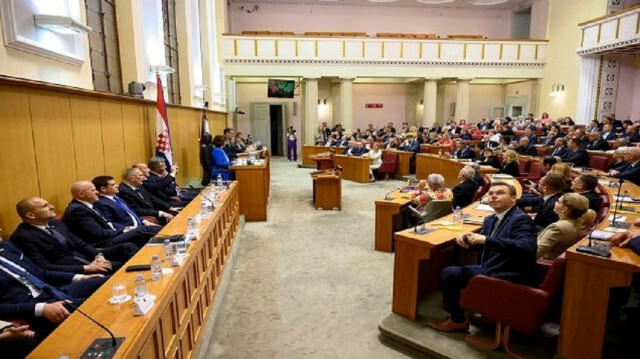Saudi Non-Oil Sector: Steady Growth in April PMI
Saudi Arabia's non-oil private sector continues its robust expansion as April's PMI holds steady, reflecting strong domestic demand and business confidence.
Published May 06, 2024 - 00:05am

Image recovered from english.mubasher.info
Riyadh - Saudi Arabia's non-oil private sector sustained its growth momentum in April, supported by healthy domestic demand and proactive market responses, as shown in several reports. The Purchasing Managers' Index (PMI), a critical economic health indicator for the non-oil sector, remained unchanged at 57.0 in April 2024, according to data from Riyad Bank, S&P Global, and reports by Reuters. This consistency signals enduring robust operational conditions for businesses in the non-oil sector.
The unchanged April PMI figures match the previous month's data, demonstrating unwavering growth dynamics in the sector. Despite a slight dip in new orders compared to March, business conditions remained favorable, largely propelled by solid domestic market performance. In contrast, although there was marginal deceleration in the Output subindex and a decline in job creation influenced by cost sensitivities, companies continued to increase purchasing activities in anticipation of sales growth.
Experts like Naif Al Ghaith, Chief Economist at Riyad Bank, and David Owen, Senior Economist at S&P Global Market Intelligence, have pointed out the surge in new orders and inventory expansion as a sign of proactive market engagement. This trend suggests a possible leap in non-oil GDP, potentially surpassing the 4.5% threshold for the current year. Key factors driving this positive trajectory include competitive pricing, promotional initiatives, and strategic marketing endeavors, particularly noticeable in the Wholesale and Retail sectors.
The non-oil sector's performance reflects broader economic stability in Saudi Arabia, despite a reported 1.8% contraction in the overall economy due to declining oil activities. Nevertheless, with a positive 12-month business outlook and an encouraging environment for expansion and stability within the non-oil economy, the Kingdom is poised for ongoing economic prosperity. This reflects a wider commitment to economic diversification as part of its Vision 2030 agenda.
The persistence of robust PMI figures in Saudi Arabia's non-oil private sector is exemplified by the impetus of infrastructural projects and technological initiatives that are concurrently taking place. Saudi Arabia's vision to implement smart city projects, such as the ambitious NEOM, is stirring substantial investment in construction, technology, and services. These ventures not only elevate the domestic demand but also attract foreign investment, aiding the growth of the non-oil sectors.
Technology and innovation are becoming integral to Saudi Arabia's economic fabric. The burgeoning tech startup ecosystem is receiving strong government support through fund injections and regulatory facilitation. The launch of various incubators and accelerators has fostered a nurturing environment for tech-driven entrepreneurship, which is reflective in the increasing number of fintech firms, E-commerce platforms, and digital service providers bolstering the private sector's output.
Healthcare and tourism are other pivotal sectors experiencing expansion and contributing to the non-oil private sector growth. The government's focus on enhancing healthcare facilities, mirrored by the construction of new hospitals and adoption of telemedicine services, is a testament to the sectoral diversification efforts. Meanwhile, the tourism industry is being revamped through cultural and entertainment projects, relaxation of visa regulations, and marketing campaigns aimed to showcase the Kingdom as a prime tourist destination, further inflating non-oil sector activities.
These sectors are leveraging a slew of reforms under Saudi Arabia's Vision 2030, which are gradually altering the business landscape. The introduction of new business licenses for international entrepreneurs and the reduction of bureaucratic hurdles have orchestrated a more favorable environment for business formation and expansion, facilitating opportunities for investors both locally and internationally.
A closer look at the labor market reveals strategic efforts to upskill the Saudi workforce to meet the demands of a diversifying economy. Initiatives such as the “Saudization” policy, aimed at increasing the employment of Saudi nationals in the private sector, and extensive professional training programs, signify a long-term investment in human capital which is critical to sustaining growth in the non-oil private sector.
Financial institutions have played a role in the evolving economic landscape by extending credit facilities and innovating financial products to suit the needs of burgeoning businesses. The Saudi Central Bank has implemented policies to ensure liquidity and promote lending, which has positively impacted consumer and business spending within the Kingdom’s non-oil economy.
The environmental sustainability factor, part of the Vision 2030’s comprehensive framework, is also gaining traction. Renewable energy initiatives and investments in green infrastructure are aligning with the global shift towards sustainability, providing new avenues for economic activities that are not reliant on fossil fuels.
Conclusively, the non-oil sector's buoyant performance is illustrative of Saudi Arabia’s holistic approach to economic development. As geopolitical factors present fluid challenges, the Kingdom’s proactive measures and strategic foresight continue to serve as a bulwark against these uncertainties, steering the economy towards an optimistic future. The unwavering non-oil sector growth propounded by April’s PMI demonstrates the tenacity and dynamism of an economy in the throes of transformation. With this formidable momentum, Saudi Arabia marches forward in its quest for a diversified economic landscape, ready to meet the aspirations laid out in Vision 2030.

:format(jpeg)/cloudfront-us-east-1.images.arcpublishing.com/elespectador/E4FBVWFOZFFKJPADSHULE3OZ5U.jpg)





